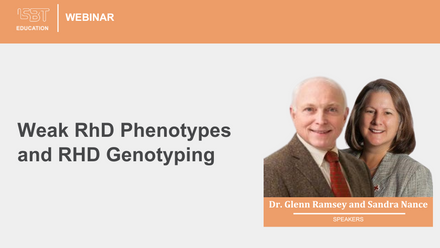The Crossmatching 2.0 session included the following presentations:
1. Christine Lomas Francis: CD47 Biotherapy: A new incompatibility threat
2. Tae-Shin Kim: The effects of IMC-002, a novel anti-CD47 monoclonal antibody, on pretransfusion compatibility testing
3. Wenhui Li: CD71+ RBCs Mediate Increased Erythrophagocytosis and Reduced Monocytes in Human Suspension Assay
4. Siying Zhu: Evaluating the clinical significance of alloantibodies against GP.Mur using flow cytometry phagocytosis assay
5. Anne Cornelissen: Detection of erythrocyte alloantibodies in patient sera using a novel flow cytometry approach
MODERATORS: Sofia Lejon Crottet, Roland Fiskesund
After the presentation, there was a questions and answers session, which is also included in the recording.
Abstract
CD71+ RBCs mediate increased erythrophagocytosis and reduced monocytes in human suspension assay
W Li1, S Hemmatibardehshahi1, R Osmani1, J Acker1,2
1Laboratory Medicine and Pathology, University of Alberta, Edmonton, Canada, 2Innovation and Portfolio Management, Canadian Blood Services, Edmonton, Cameroon
Background: Circulating immature red blood cells (CD71+ RBCs) have been shown to modulate the immune system, potentially through their enriched intracellular reactive oxygen species (ROS). As CD71+ RBCs are differentially present in blood products from male and female donors, they may play an important biological role in adverse donor-recipient sex-mismatched transfusion reactions. The erythrophagocytosis of RBCs by monocytes can be used in vitro to assess the risk of intravascular haemolysis from incompatible blood transfusions.
Aims: To investigate the effect of CD71+ RBCs on the erythrophagocytosis and RBC lysis and how CD71+ RBCs may affect these processes.
Methods: Enriched CD71+ RBCs (32.3% ± 3.9, n = 3) and CD71- RBCs were isolated from donated whole blood using Percoll gradient density separation. We incubated enriched CD71+ RBCs and CD71- RBCs with allogenic peripheral mononuclear cells (PBMCs) for 4 hours (37°C, 5% CO2). CD71+ RBCs were incubated in three ratios with anti-D sensitized CD71- RBCs in the presence of PBMCs. The phagocytosis index (RBC PI, the percentage of monocytes that phagocytose CD71- RBCs and CD71+ RBCs) was determined using image flow cytometry by surface staining monocytes with CD14 and then intracellularly staining the RBCs with CD235a and CD71. RBC lysis was examined spectrophotometrically. Linear regression was performed to explore the relationship between the RBC PI, RBC lysis and CD71+ RBC proportion. ROS antioxidant N-acetyl cysteine (NAC) was used to investigate how CD71+ RBCs affect erythrophagocytosis. ROS was determined using dihydrodichlorofluorescein diacetate (H2DCF-DA).
Results: The enriched CD71+ RBC group showed a significantly higher RBC PI (11.3% ± 2.1%) compared to the CD71-RBC group (5.9% ± 0.9%; n = 3; p < 0.05). There were positive correlations between the dose of CD71+ RBC and CD71+ RBC PI (R2 = 0.77, p < 0.0001), and RBC lysis (R2 = 0.68, p < 0.01). The high CD71+ RBC group exhibited a significant reduction in the normalized monocyte number (46.8% ± 2.0%, p < 0.01), compared to the CD71- RBC group. Compared to the non-treated group (48.8% ± 3.0%), the reduction of normalized monocyte number was partially reversed in the NAC-treated group (46.6% ± 3.8%; p > 0.05). There was lower ROS expression in NAC-treated CD71+ RBCs than in untreated CD71+ RBCs (p > 0.05). There was no significant difference in RBC PI between the NAC-treated and untreated groups (p > 0.05).
Summary/Conclusions: Donated CD71+ RBCs enhance erythrophagocytosis of CD71+ RBCs in a dose-dependent manner and suppress monocytes. Treatment with NAC reduced ROS but did not affect CD71+ RBC PI. This work contributes to understanding immature CD71+ RBCs' role in post-transfusion immunobiology.




